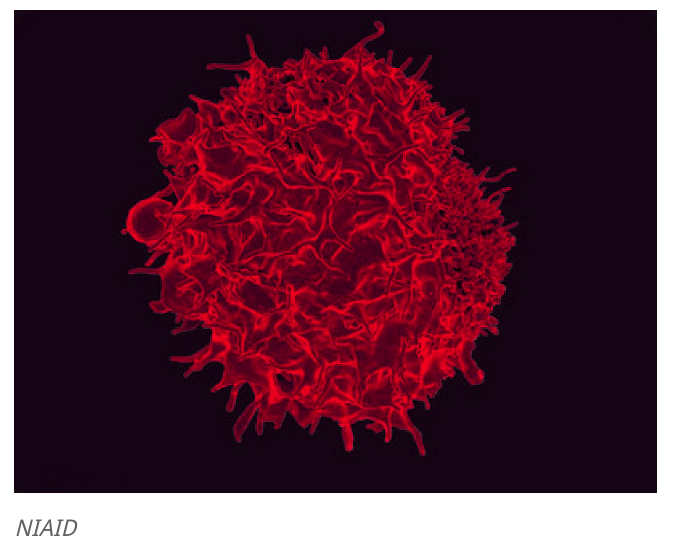Investigational mRNA Vaccine Induced Persistent Immune Response in Pre-Clinical Trial of Pancreatic Cancer Patients
 An experimental approach to treating pancreatic cancer with the messenger RNA (mRNA)-based therapeutic cancer vaccine candidate autogene cevumeran shows potential to stimulate an immune response that may reduce the risk of the disease returning after surgery.
An experimental approach to treating pancreatic cancer with the messenger RNA (mRNA)-based therapeutic cancer vaccine candidate autogene cevumeran shows potential to stimulate an immune response that may reduce the risk of the disease returning after surgery.
New results from a phase 1 clinical trial show that the cancer vaccine candidate activated immune cells that persisted in the body up to three years after treatment in certain patients. In addition, a vaccine-induced immune response correlated with reduced risk of the cancer coming back.
“The latest data from the phase 1 trial show that we are on the right track. This investigational mRNA vaccine can trigger T cells — the cells that mobilize anti-tumor immune responses — that may recognize pancreatic cancers as foreign,” says Memorial Sloan Kettering Cancer Center (MSK) pancreatic cancer surgeon-scientist Vinod Balachandran, MD. “Moreover, we continue to detect vaccine-stimulated T cells at substantial frequencies in patients’ blood up to three years after vaccination.”
Autogene cevumeran (BNT122, RO7198457) was developed through a collaboration between BioNTech, an immunotherapy company, and Genentech, a member of the Roche Group. Dr Balachandran, who led the phase 1 trial, presented the latest results at the American Association for Cancer Research Annual Meeting in San Diego.
Pancreatic cancer is one of the deadliest cancers, and even with surgery, only about 12% of patients are alive five years after diagnosis. Chemotherapy, radiation, targeted therapy, and current immunotherapies are also largely ineffective against pancreatic cancer, so new therapies are urgently needed for patients who face this disease.
The investigational mRNA cancer vaccines were custom-made for every participant in the phase 1 clinical trial based on the mutational profile of each individual tumor. The cancer vaccines teach T cells to recognize proteins called neoantigens that are found exclusively in each patient’s pancreatic tumor. In this way, these vaccines alert the immune system that the cancer cells are foreign. The goal of this approach is to train the body to protect itself against cancer cells.
Initial results from the phase 1 trial, reported May 2023 in Nature, showed the vaccine was well tolerated and that it activated immune cells in half of treated patients. The latest results are based on following patients for a median of three years after the investigational treatment. The team was able to track vaccine-induced T cells with the help of computational biologist Benjamin Greenbaum, PhD.
“Our findings thus far show that this vaccine candidate can induce a lasting immune response — up to three years — in some patients,” explains Dr Balachandran, a member of the Human Oncology and Pathogenesis Program and the David M. Rubenstein Center for Pancreatic Cancer Research at MSK. “As these are critical features of an effective cancer vaccine, the results continue to support the approach of using customized mRNA vaccines to target neoantigens in each patient’s tumor.”
The investigator-initiated, single-center trial involved studying 16 MSK patients who received autogene cevumeran, along with an immunotherapy drug called atezolizumab and a chemotherapy regimen called mFOLFIRINOX. At the three-year median follow-up:
In 8 patients, the investigational cancer vaccine activated a T cell response, and 6 of these patients had not seen their cancers return during the follow-up window. The other 2 patients relapsed. Meanwhile, cancer returned in 7 of the 8 patients whose immune systems did not respond to the vaccine during the study period. Researchers do not yet know if the vaccines caused the delay in cancer recurrence; investigating this question is a goal of an ongoing randomized phase 2 clinical trial.
In the 8 patients who responded, the vaccines induced T cells specific to vaccine-encoded neoantigens. By studying tissue and blood from these patients before and after vaccines were given, the team found that 98% of the T cells specifically activated by the cancer vaccines were not present before vaccination. In addition, more than 80% of the vaccine-induced T cells persisted from two to up to three years after treatment. These data suggest the investigational cancer vaccine stimulated a durable T cell response.
A phase 2 clinical trial (NCT05968326), sponsored by Genentech in collaboration with BioNTech, will evaluate the efficacy and safety of autogene cevumeran in a larger patient group. The new study, which began in July 2023, will enroll approximately 260 patients at various sites around the world, including MSK.
“Given the positive data from our phase 1 trial, we are excited to evaluate individualized mRNA cancer vaccine candidates in more pancreatic cancer patients,” Dr Balachandran says.
The phase 2 trial will study whether the mRNA approach works better than the current standard treatment.